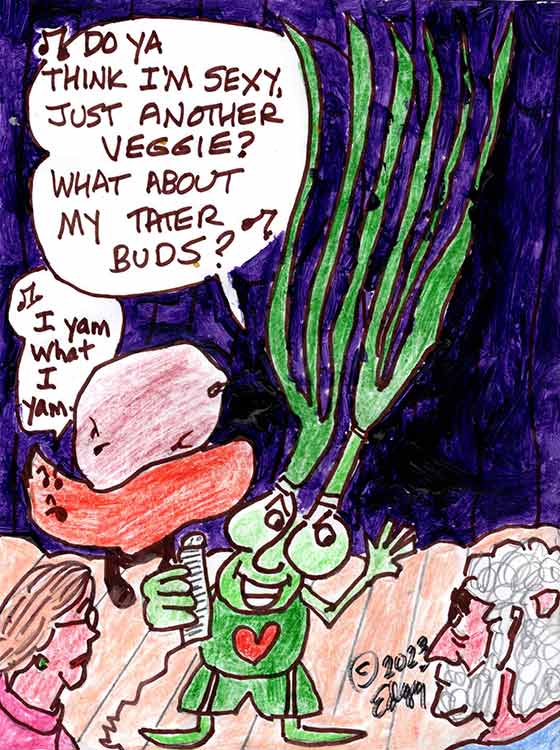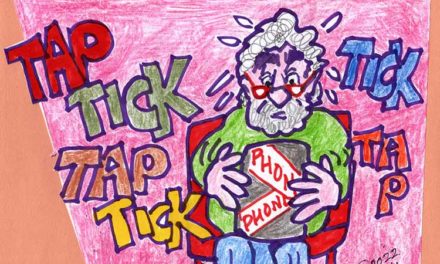“Wonky” Veggies Just Won’t Take It Anymore
When side dishes start taking sides, it isn’t pretty
By Ed Goldman
Just when we thought Great Britain was out of step with the rest of the world, here comes the Wonky Veggies Movement.
Unlike our use of the word “wonky,” which usually describes someone in government who’s obsessed with policy details—or, stretching that, a two-word comment about Justin Bieber’s singing range—our friends on the other side of the pond use the term interchangeably with “ugly.”
Rap Scallion and the Starchies
They do this when referring to what they deem to be physically unattractive produce, like twisted carrots, questionably shaped yams, bad-postured bananas and possibly phallic-looking broccoli.
But here’s the catch: While those veggies usually have just as much taste as well as just as high nutrient and vitamin values as their more seemingly toothsome counterparts, they get tossed away by grocers, restaurants and even some of the growers who raised them from evidently grotesque-looking seedlings.
“Globally, one third of all food produced is wasted. That’s about 1.3 billion tonnes every year,” reports the website wonkyfoodco.com. (Don’t blame the company for misspelling “tons.” We’re not much better here in the US of A: I mean, since it’s not pronounced “tawns,” shouldn’t it be spelled “tuns?” Discuss in small groups and select a leader to report out.)
“In the UK alone,” the site continues, “we tell 40% of everything we grow to go rot, simply because it isn’t pretty enough for the shop shelf.” (Aha! The English scoff at us for talking to our houseplants but they say downright mean things to their vegetables. “Go rot”?! That sounds even more vicious than “Go to Hell” or “May your children be orphans.”)
Okay, back to the site: “We’re on a mission at The Wonky Food Company to do our bit to help reduce food waste. …We are working with farmers, suppliers and retailers to collect their imperfect and surplus fruit & veg and turn it into fabulous tasting products.”
Ever since a sommelier described a wine he was decanting for me as having “a great pair of legs,” I get a bit leery when people deploy anthropomorphic adjectives for comestibles and potables. I once got the same feeling, though slightly less icky, when a barista was describing a particular blend as “a beautiful coffee.” Apparently she thought beauty was bean deep.
That aside, why should vegetables even be attractive? Is a ribeye steak charismatic? Is a roast chicken alluring? Is a baked potato eye-catching, a salad alluring, a bowl of soup stunning?
Veggies deserve respect for reasons other than superficial glam. I don’t recall ever considering a celery stalk handsome, a beet lovely or a peapod darling, but I ate them all the same. If they’d looked crippled by arthritis or, God forbid, had a torn ACL (which apparently is what ACLs are destined to be) but still tasted like their sexier-looking counterparts, I happily consumed them. And—who knows?—I might even have found them more savory, just because their appearance didn’t ruin my ultimate experience of stuffing them into my maw.
If you’ve ever sprinkled golden raisins on your oatmeal, you know whereof I speak. They taste just like the brownish kind; but they look more exotic sitting on and within the gray mush. But if you think golden raisins are somehow better for you, I reference these two online judgments:
- “Golden raisins… are made from the same green grapes as regular, brown-colored seedless raisins.” Since that comes from the site sunmaid.com, you might suspect the findings. However…
- If so, consider this statement from fitday.com: “The bottom line is that all raisins are similar nutritionally, so choose the one that fits your taste preference.”
So let’s all eat our vegetables—whether they’re ugly rutabagas, hideous Brussels sprouts, unsightly French green beans, revolting cauliflower, repulsive lima beans or frightful scallions. Let’s stop paying lip service to their importance in our diets and walk the wonk.
Ed Goldman's column appears almost every Monday, Wednesday and Friday. A former daily columnist for the Sacramento Business Journal, as well as monthly columnist for Sacramento Magazine and Comstock’s Business Magazine, he’s the author of five books, two plays and one musical (so far).












